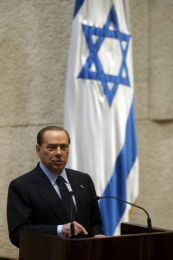No one is perfect, especially a politician. So there are many reasons why Italians, and many politicians around Europe, have differing views of the former Prime Minister of Italy, Silvio Berlusconi. His positive views and sane policies however, vis-a-vis Italy and the Jewish state of Israel, are at least some of the reasons why he has many enemies domestically and abroad. While I have mixed feelings about Silvio, he was/still is however, a good friend of Israel and the Jews, and I’m appreciative of his efforts in fostering those warm relations. KGS
Op-Ed: Interview with Vitttorio Segre: Jews Under Berlusconi
 “Italy has a population of about sixty million. When one asks educated Italians how many Jews live in the country, the most frequent answer is ‘half a million.’ In reality the number of paying members of the Italian Jewish community is thirty-one thousand, or five for every ten thousand Italians. There are probably another few thousand Jews who do not publicly identify as such, but no reliable estimates of these people exist. In addition there are many cultured, educated, or well-off Italians who will tell you that they are partly of Jewish origin.
“Italy has a population of about sixty million. When one asks educated Italians how many Jews live in the country, the most frequent answer is ‘half a million.’ In reality the number of paying members of the Italian Jewish community is thirty-one thousand, or five for every ten thousand Italians. There are probably another few thousand Jews who do not publicly identify as such, but no reliable estimates of these people exist. In addition there are many cultured, educated, or well-off Italians who will tell you that they are partly of Jewish origin.
“The two major Jewish communities in Italy are Rome with twelve thousand registered Jews and Milan with six thousand and a few thousand unregistered. Native Italian Jews probably do not number more than fifteen thousand. In Rome there is a sizable Libyan Jewish community. Iranian and Lebanese Jews have developed social centers in Milan so as to foster marriages within theircommunities. Jewish immigrants from Egypt, Morocco, Gibraltar, and Germany as well as Israelis in smaller numbers are dispersed among various communities.”
Dan Vittorio Segre has been a professor of political science at several universities including the University of Haifa, MIT, Stanford, and until recently the University of Lugano. He has simultaneously been involved in journalism for many decades. One of Segre’s books Memoirs of a Fortunate Jew is an international bestseller.
Segre remarks: “The false perception that there are so many Jews in Italy derives from the fact that they are considered so prominent. A number of Jews have indeed played key roles in Italian society over the past century and a half.
“After the Second World War Italian Jews stayed out of several areas in which they had been active in the past such as politics and the military. There were however still a few Jewish politicians in the Communist and Socialist parties.

At one point, four out of six living Italian Nobel Prize winners were Jewish.

“In recent decades Italian Jews have also contributed greatly to science. At one point, four out of six living Italian Nobel Prize winners were Jewish. All emigrated to the United States following the racial laws.
“Under the Berlusconi government, Israel’s position in Italy was radically different from that in many other European countries. For this government Israel was not a problematic country. Berlusconi and his followers are pro-Israeli and say so clearly, including in the forums of the European Union.
In the 2008 elections, Fiamma Nirenstein, a Jewish journalist and author, became a parliamentarian of Berlusconi’s Freedom Party. She is vice-president of the parliamentary commission for foreign affairs. She has been very visible, for instance in organizing pro-Israeli activities.
“During the 2008-2009 Gaza war there were anti-Israeli demonstrations in several Italian cities. However, one of the most impressive pro-Israeli demonstrations in Europe took place on 14 January 2009 in Rome. More than a hundred parliamentarians from different parties participated.[i] The initiative for this demonstration was taken by Nirenstein. She later attacked Sweden’s foreign minister Carl Bildt when he refused to condemn an anti-Semitic article in the Swedish anti-Israeli daily Aftonbladet.
“The political support of the Berlusconi governments for Israel and other favorable factors gave Italy’s Jews new self-confidence.
There are some other notable indications. In Italy all taxpayers must decide on a contribution of 0.8 percent of their tax assessment to a religious or other approved organization. The number of Italians who, for instance in 2008, decided to allocate this money to the Jewish community was sixty-one thousand. This far exceeds the number of Jewish families in Italy and is a sign of sympathy from non-Jewish Italians.
“This sudden reemergence of Italian Jewry, because of developments not related to them in the country, has made Italian Jews proud of their identity. The Italian Jewish community now speaks out on many issues. Renzo Gattegna, chairman of the Italian Union of Jewish Communities is often called upon to comment on various issues such as mixed marriages, medical use of embryos, or the 2009 Swiss vote against minarets. This is very different from the situation with his predecessors when Jews aligned themselves with a political trend or preferred not to take positions.”
“Chabad is very active. It also plays a prominent role in the public domain when during Chanukah, in Piazza Barberini at the bottom of Rome’s most famous street Via Veneto, a large menorah is erected and lighted in a public ceremony each night of the holiday.
“A new synagogue, the sixteenth in Rome’s area, has been inaugurated in the Ostia quarter where there is now a small Jewish community. In this former Roman port there are also the ruins of a two-thousand-year-old synagogue.
“All this reflects both a Jewish vitality that a few decades ago would have been unthinkable and a more positive perception of the Jews by society at large”.
This is posited by the author as the general situation despite manifestations of media and pro-Palestinian anti-Semitism.
The writer has been a long-term adviser on strategy issues to the Boards of several major multinational corporations in Europe and North America. He is the Chairman of the Board of the Jerusalem Center for Public Affairs.

